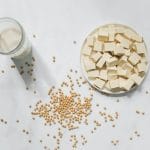According to studies on Google trends, the search volume for health and fitness has never been as high as it has been in the past couple of years. Apart from the sales of gym memberships and gym equipment reaching an all-time high, people across the globe have grown significantly more interested in consuming a healthy diet to maintain and improve their physical fitness.
Whether we credit the global emergence and spread of social media platforms or the ever-rising number of internet influencers, there is no denying that today’s consumers are far more aware than they have even been.
A significantly large part of the population is well-aware of how their bodies work, which food items will affect their bodies in what ways, and what kind of a diet they need to consume to achieve their personal fitness goals. Many publications go as far as to saying that being physically fit is the new concept of being beautiful.
Due to this ongoing global search for the ultimate healthy diet and lifestyle, the debate regarding whether plant-based milk is healthier than animal produced milk continues to get more popular with every passing day.
While some dietitians and fitness experts claim that traditional animal milk is an irreplaceable part of a healthy diet, many specialists contest this claim. These specialists argue that consuming plant-based milk over animal milk is the answer to living a healthier, and a more youthful life.
So, is plant-based milk as healthy as animal milk? Continue reading to learn what plant-based milk is and who generally consumes it. Moreover, the article will also shed light on the nutritional value and the pros and cons of both kinds of milk to help you decide which milk is ideal for your personal needs.
Let’s get started!
What Are the Two Main Types of Milk?
Although the milk produced from plants cannot technically be categorized as real milk according to the Oxford definition, it has been globally referred to as plant milk anyway.
What Is Plant-based Milk?

As the name suggests, plant-based milk is a type of milk that is produced from plant sources. This type of milk is not collected directly from the plant, but instead needs to go through a small production process.
Despite the similar appearance and consistency, plant-based milk contains no animal products at all. The nutritional value one can get from plant-based milk is completely different than what a person can get by consuming animal milk.
Although both types of milk forms have different origins, plant-based milk can be used in almost similar ways as animal produced milk. Some of the most popular ways people across the globe consume plant-based milk are as follows:
- s a tea whitener
- with coffee grounds to make popular vegan coffee beverages
- s an animal milk substitute when making cakes, waffles, pancakes, bread, curries, etc.
- onsumed directly
Some of the most popular types of plant-based milk include:
- Oat milk
- Soybean milk
- Coconut milk
- Almond milk
- Rice milk
How is Plant-based Milk Produced?
While animal milk can even be consumed directly from animals, plant-based milk needs to undergo a particular production process. It is not collected directly from the plant; instead, different plant-based food forms are combined with water to create a milk-like mixture.
For instance, let us look at the example of almond milk. In order to produce almond milk, one has to soak organic almonds in hot water to make them softer and remove their peels. The soaked almonds then get added to a strong and powerful blender along with a portion of filtered water.
The blender is able to create a thick mixture of almonds and water. The mixture is then pressed and strained through a cheesecloth or a fine mesh to separate the liquid from the dry solid particles.
This process produces creamy white and milk-like almond milk which can then be stored for later use, used in cooking, or consumed directly.
What is Animal Milk?
Animal milk is the type of milk that humans have been consuming since the very beginning. This form of milk is collected from a female mammalian animal, and is usually white in color.
While health experts recommend that animal milk should be sterilized and cleaned before consumption, many people across the globe do consume the milk directly as well.
Animal milk is usually collected from cows, buffalos, goats, sheep, and camels; however, some people do have a liking for more exotic milk forms, such as rabbit milk or horse milk.
Usually, most animal produced milk forms have a yellow to cream white color; however, the milk from different animals can vary significantly in terms of consistency, smell, taste, and nutritional value.
Who Consumes Plant-based Milk?
Although plant-based milk is assumed to be a product of more recent times, one might be shocked to learn about the rich historical references of their origin. As a matter of fact, many plant-based milk forms, such as almond milk, are said to have existed for nearly 1000 years.
Although there is no specified rule as to who can and cannot consume plant-based milk, people who usually consume plant-based milk are as follows:
- People living a vegan or a vegetarian lifestyle
- Environmentalists or people who love animals and believe in the dairy industry being cruel
- People who have lactose intolerance
- People who are not allowed to consume animal produced milk as per their cultural and religious norms
- People who like plant-based milk for its nutty flavor and unique consistency
- People who prefer plant-based milk for its nutritional value
Although most people can consume plant-based milk, people who have some type of plant related allergy, such as nut allergy, are strictly advised against it. This is because any amount of plant-based milk consumption by an allergic individual can become lethal within seconds.
Who Consumes Animal Milk?
- nfants of mammalian animals
- People who enjoy the taste and consistency of animal milk
- People who have no access or exposure to plant-based milk forms
- People who prefer animal milk for it nutritional value
- People who do not have lactose intolerance
- People who are not bound by religions or cultural rules to refrain from animal milk
Plant-based Milk Versus Animal Produced Milk: Which is the Healthier Milk Form?

Although some celebrities and social media influencers will go as far as claiming that animal milk can be extremely dangerous, baseless claims have not helped this global debate in any way. When we compare the two kinds of milk to decide which type is nutritionally superior to the other, we need to back our statements by scientifically tested and proven facts and information.
Read on for a direct comparison between the proven nutritional value of plant-based milk versus animal milk.
Plant-Based Milk Versus Animal Produced Milk: Which has More Protein?
Protein is one of the most nutritionally valued substances found in both animals and plants. They are directly involved in the various chemical processes that are necessary for different living organisms.
There is absolutely no doubt that animal milk is known for its high protein content. As a matter of fact, the high protein content is exactly why infants are fed milk during their early years as it helps them grow.
Although animal milk is usually assumed to be significantly richer in terms of protein content, people will be surprised to learn that many plant-based milk forms contain comparable amounts of protein as well. As a matter of fact, soy milk, pea milk, and cow milk are said to have almost the same amount of protein.
For a clearer comparison between the protein content of animal milk versus plant-based milk, let us look at how much protein is found in one standard cup or 128 grams of different kinds of milk.
- 1 cup of cow milk contains almost 8 grams of protein
- 1 cup of buffalo milk contains almost 9 grams of protein
- 1 cup of goat milk contains almost 9 grams of protein
- 1 cup of almond milk contains almost 1 grams of protein
- 1 cup of oat milk contains almost 4 grams of protein
- 1 cup of soy milk contains almost 8 grams of protein
- 1 cup of pea milk contains almost 7 grams of protein
- 1 cup of coconut milk contains almost 5 grams of protein
Here, we can see that although buffalo milk and goat milk contain the highest amount of protein, soy milk, pea milk, and cow milk are not too far behind.
Hence, a person wishing to consume milk as part of a high-protein diet does not have to restrict themselves to an animal-based diet. Instead, they can also consume pea, soy, and even coconut milk for their daily dose of protein.
Plant-Based Milk Versus Animal Produced Milk: Which has More Calcium?

Calcium is the key mineral one needs for healthy bones and teeth. Apart from strengthening the skeletal system, calcium also plays an integral part in forming blood clots, regulating our heartbeats, and improving muscle contraction as well as the nervous system.
A direct link between calcium consumption and animal milk has been marketed since the very beginning due to the high calcium content that is found in almost all types of animal milk forms.
However, many people are rather shocked to learn that they do not have to rely on animal produced milk for their calcium requirements. Instead, different studies have proven that many types of plant-based milk have an even higher concentration of calcium than what is found in animal milk.
For a direct comparison between the calcium content of animal produced milk versus plant-based milk, let us look at how much calcium is found in one standard cup or 128 grams of different kinds of milk.
- 1 cup of cow milk contains almost 305 milligrams of calcium
- 1 cup of buffalo milk contains almost 230 milligrams of calcium
- 1 cup of goat milk contains almost 327 milligrams of calcium
- 1 cup of almond milk contains almost 560 milligrams of calcium
- 1 cup of oat milk contains almost 350 milligrams of calcium
- 1 cup of soy milk contains almost 60.8 milligrams of calcium
- 1 cup of pea milk contains almost 560 milligrams of calcium
- 1 cup of coconut milk contains almost 450 milligrams of calcium
The information provided above clarifies that animal milk is not the only source of calcium. Instead, many plant-based milk forms can offer even greater amounts of calcium to nourish your bones and improve the different functions of your body.
Plant-Based Milk Versus Animal Produced Milk: Which has More Fat?
While many people assume that all kinds of fats lead to weight gain and are bad for the body, this assumption is far from the truth. As a matter of fact, many types of unsaturated fats are needed by the human body for multiple reasons.
Fat not only acts as an energy reserve for the body, but it also allows our skin to have the soft and youthful texture everyone desires. Hence, it is important to consume some fat.
Both animal milk as well as plant-based milk contain fat; however, the amount varies with different milk sources and types.
To compare the fat content of animal produced milk versus plant-based milk, let us look at how much fat is found in one standard cup or 128 grams of different kinds of milk.
- 1 cup of cow milk contains almost 8 grams of fat
- 1 cup of buffalo milk contains almost 17 grams of fat
- 1 cup of goat milk contains almost 10 grams of fat
- 1 cup of almond milk contains almost 3 grams of fat
- 1 cup of oat milk contains almost 1.3 grams of fat
- 1 cup of soy milk contains almost 4.14 grams of fat
- 1 cup of pea milk contains almost 4.5 grams of fat
- 1 cup of coconut milk contains almost 4 grams of fat
It is easy to conclude from the information provided above that plant-based milk forms are significantly healthier than animal milk in terms of their fat content.
Although fat is necessary, one has to control its consumption to maintain or reduce their body weight, in order to live a healthier life. However, not all plant-based milk forms are ideal for their fat content.
For instance, although coconut milk contains only 4 grams of fat in 1 cup, this is saturated fat. According to health experts, high consumption of saturated fats can increase a person’s chance of developing heart-related diseases.
Hence, if you’re on a low-fat diet, avoid buffalo milk at all costs, and consume plant-based milk other than coconut milk as often as you can.
Plant-based Milk Versus Animal Produced Milk: Which has More Sugar?

We know that too much sugar is bad for our bodies. It can contribute to the development of diabetes, and can lead to unhealthy weight gain and obesity. Moreover, excessive sugar consumption is also bad for the teeth, and is also found to be linked with premature aging of the skin.
Animal milk forms and plant-based milk contain different amounts of sugar. In order to live a healthy life, We should know which milk type has the most and the least amount of sugar.
To compare the sugar content of animal milk versus plant-based milk, let us look at how much sugar is found in one standard cup or 128 grams of different kinds of milk.
- 1 cup of cow milk contains almost 12 grams of sugar
- 1 cup of buffalo milk contains almost 13 grams of fat
- 1 cup of goat milk contains almost 11 grams of sugar
- 1 cup of almond milk contains almost 2 grams of sugar
- 1 cup of oat milk contains almost 3 grams of sugar
- 1 cup of soy milk contains almost 10 grams of sugar
- 1 cup of rice milk contains almost 5 grams of sugar
- 1 cup of coconut milk contains almost 6 grams of sugar
If you are trying to cut on your daily sugar consumption and are looking to shed a few pounds, switching to certain plant-based milk forms from animal milk is a great idea.
As listed above, almond milk, oat milk, and rice milk contain a significantly lower amount of sugar compared to cow, buffalo, or goat milk. Hence, if you do have access to plant-based milk, start consuming them if you want to achieve your fitness goals.
Plant-Based Milk Versus Animal Produced Milk: Which has More Essential Vitamins?

Vitamins should be an essential part of an individual’s diet. They help maintain normal hormonal balance, boost a person’s energy levels, help improve mood, and are essential for healthy bodily functions.
To compare the vitamin content of animal milk versus plant-based milk, let us see which vitamins are found in what amounts in different kinds of milk forms.
- 224 grams of cow milk contains almost 34 grams of Vitamin A, 2 grams of Vitamin B, 0 grams of vitamin C, and 98 grams of Vitamin D
- 224 grams of buffalo milk contains almost 129 grams of Vitamin A, 2 grams of Vitamin B, and 5.6 grams of Vitamin C
- 224 grams of goat milk contains almost 138 grams of Vitamin A, 2.5 grams of Vitamin B, and 50 grams of Vitamin D
- 224 grams of almond milk contains almost 10% of Vitamin A, no Vitamin C, and 9% Vitamin D
- 224 grams of oat milk contains almost 20% Vitamin B
From this information, we can conclude that both kinds of milk contain different vitamins. However, if a person chooses to shift to a plant-based diet, they can make up for their required vitamin intake by consuming fruits and nuts.







